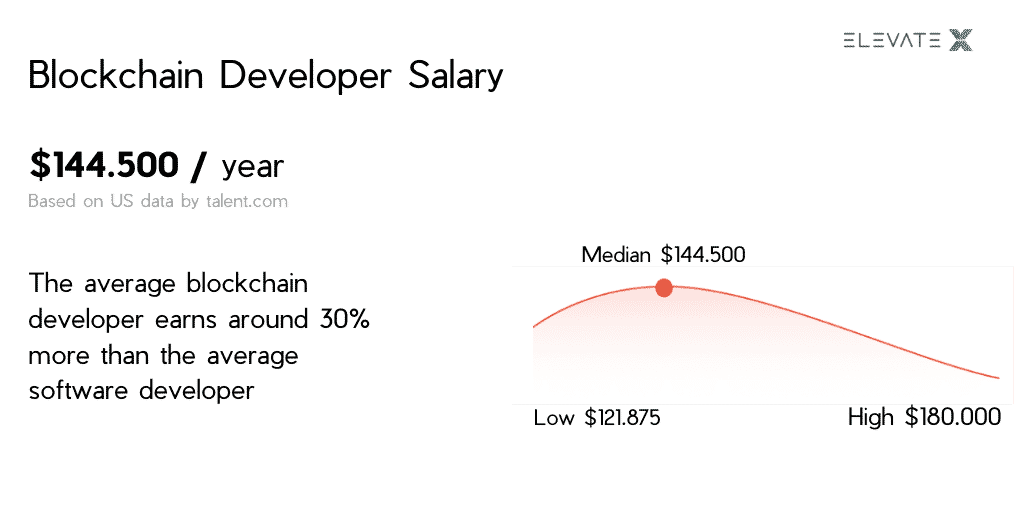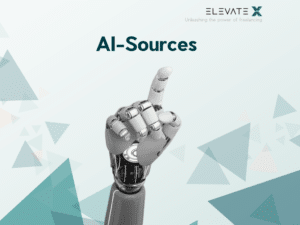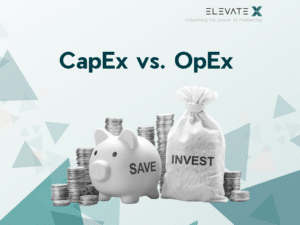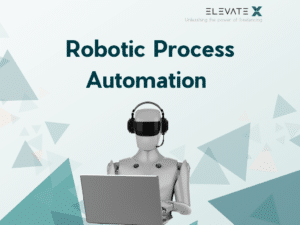In our last article, we created a basis for the blockchain topic and explained the basics in more detail. In general, the topic is very much on the rise and we at ElevateX are also dealing with the topic. Thus, there is also an extra section on Blockchain and Web 3.0 in our blog. Especially, blockchain developers who are experienced in this area are currently in high demand.
In this article, you will find some tips to get started as a developer on the topic of blockchain.
What Is a Blockchain Developer?
Blockchain developers design, implement and test blockchains as well as blockchain-based solutions or applications. As the blockchain field is currently enjoying high demand, many industries are looking for suitable experts. Therefore, blockchain developers can be found in many IT departments of almost all economic sectors.
Especially in the financial industry, e.g., at banks, it is evident how important the topic of blockchain is and how high the demand for suitable developers is. In the area of finance, blockchain solutions are particularly suitable. Therefore, banks aim for solutions in this area to gain competitive advantages.
According to the German Federal Employment Agency, a degree in, for example, computer science or business information systems is usually required. A completed relevant training or further education can also provide access to the job. In addition, there is the possibility to become a “Certified Blockchain Developer” via courses and exams. Courses for this are offered by Blockchain Council. Blockchain developers work as permanent employees and as freelancers as well.
What Does a Blockchain Developer Do?
Blockchain developers develop ways to represent, document, and control business processes, coordination processes, or financial transactions using a blockchain solution.
Blockchain developers are responsible for designing and customizing blockchain-based solutions. This includes, for example, the introduction of smart contracts in companies or public authorities.
Blockchain development includes a lot of creative work. Since many areas do not have a precedent for using the blockchain yet, testing and creative work needs to be done.
Another important part of a blockchain developer’s job is connecting the blockchain solution with non-blockchain solutions. Blockchain developers define data structures and develop the interfaces to other components and systems. This is of great importance, as only in this way all systems can run smoothly, communicate with each other, and the Blockchain have a great benefit.
If the interaction of different systems does not work in final tests, the developers have to go troubleshooting and find solutions for this. Since the technology is still in its infancy, a lot of creative work and testing is necessary as well.
Top Skills to Become a Blockchain Developer
To become a successful blockchain developer, a broad range of competencies and skills is fundamental. These include core competencies such as agile project management, which are important in development. In addition, there is knowledge of database development, data encryption (cryptography), programming languages, and software testing.
Top 5 Programming Languages in Blockchain Development:
- C++
C++ enables efficient and low-level programming, which is also the strength of the programming language. In contrast to the programming language C, C++ is supplemented by a standard library, which brings further important functionalities. Despite much criticism regarding resources, incomplete object orientation, and others, the programming language is also used in blockchain development, in addition to system programming and application programming.
- Python
Python is considered a relatively popular programming language. This is because Python is quite easy to learn. On the one hand, there are only a few keywords in Python, and on the other hand, the structure is significantly reduced. This contributes to better clarity. These advantages make Python particularly interesting for game development or interactive user interfaces. Google and YouTube, for example, are also partly based on Python. Python is also important for the blockchain.
- JavaScript
JavaScript represents one of the top 3 programming languages with its over 9 million developers. Various extensions to JavaScript enable additional capabilities, such as drawing interfaces and animations. Also, advertising banners, cookies, or the suggestion of search terms during the input is often programmed with JavaScript.
- Solidity
Solidity probably represents the first programming language that people from IT might not know. It is a fast-growing programming language created for programming Ethereum Virtual Machine (EVM) and smart contracts. It is based on programming languages such as C++, Python, and JavaScript.
- Rust
Rust was developed to be very practical and secure. Especially program errors, which can lead to security gaps, should be avoided here. Especially these advantages and already successful application areas, such as the Mozilla Firefox browser, make Rust an important programming language for the blockchain.
How to Become a Bockchain Developer?
Since the topic of blockchain is still relatively young but offers a lot of potentials, blockchain developers are in high demand. The topic will continue to grow in the future. Therefore, it is advisable to familiarize yourself with it as early as possible to gain extensive knowledge.
Step 1: The Basics
As already mentioned, you should have the appropriate academic background. This is not necessarily a requirement to become a blockchain developer, but it helps to understand the basics and also ensures a better project acquisition. Continuing education courses can also help to stay up to date.
Step 2: The Technical Requirements
Basic technical skills are important for development in the area of blockchain. This means:
- Master the programming languages already mentioned
- Understand data structures
- Knowledge of networking and databases
- Cryptography
- Web design and development
Step 3: The Basics of Blockchain
If you want to become a blockchain developer, you should get to know the basics of the technology.
In our Beginner’s Guide, we have summarized a simple introduction to the topic and the most important content. In our new section on Web 3.0, there will be more articles on the topic in the future.
Step 4: Cryptocurrency
An important application area for the blockchain is cryptocurrencies. Bitcoin, Ethereum, Sol, and many more. Due to the high security of the technology, such cryptocurrencies are particularly valuable, and it is important to understand the mechanisms behind them to get a full picture of the blockchain. Thus, one Bitcoin is worth over €40,000 at the moment.
Step 5: Decentralized Networks and Smart Contracts
Smart contracts are based on decentralized networks. A well-known example of decentralized networks is Ethereum and the resulting cryptocurrency Ether. Probably the most important programming language for this is the already mentioned programming language Solidity.
Step 6: Practical Experience
- Meet ups: Meet ups are where members of the blockchain community come together to share ideas, present their projects and discuss ideas. It’s a great opportunity to meet like-minded people and learn from others in the community.
- Books for Blockchain Developers: to understand the impact of cryptography on structuring data, classic guidebooks that provide an introduction to the topic can actually help.
- Training and courses: there are some really wonderful courses for developers and business people out there all the time.
- IBM: IBM also maintains a number of open source sample applications and blockchain-related features. The IBM developerWorks Blockchain Developer Center is another very useful resource for learning more about blockchain technology. There are free tools, articles, blogs, samples and tutorials there, and new content for blockchain developers is added almost daily.
What Are Types of Blockchain Developers?
Rust Developer
Rust is an open-source system programming language that focuses on speed, memory safety, and parallelism. Developers use Rust to create a wide range of new software applications, such as game engines, operating systems, file systems, browser components, and virtual reality simulation engines. Rust is also used in the development of blockchain solutions.
Selenium Developer
Selenium is an open-source tool for web browser automation. It provides an interface to write test scripts in programming languages such as Ruby, Java, NodeJS, PHP, Perl, Python, and C#.
Ethereum Developer
Ethereum is based on blockchain technology and is therefore also an open-source, decentralized system. Ethereum offers the creation, management, and execution of smart contracts. Payments are based on its own cryptocurrency, which is called Ether.
Solana Developer
Solana is based on a similar principle to Ethereum. The blockchain project also interacts with smart contracts. Only a different cryptocurrency is used. In Solana, this is called SOL.
Blockchain developers can be found both in permanent positions and on a freelance basis. The last one, in particular, is gaining popularity among developers in the blockchain field, among others.
At ElevateX, we help you to find the right partner for your blockchain project. Discover our blockchain developers here.
What is the Salary of a Blockchain Developer?
Blockchain developers are among the highest-paid developers in IT – this is unlikely to change much in the coming years. Both permanent employment and using the services of a freelancer are currently very difficult.
Blockchain, and thus experts in the field, enjoy high demand. In the U.S., where the use of blockchain is already more established, developers earn on average between $125,000 and $175,000 per year, according to Talent – by comparison, the average salary of a software engineer there is $140,000 per year.
In Europe, where blockchain is just gaining momentum, salaries average between $55,000 and $91,000, according to cryptocurrencyjobs.

How Can I Implement Blockchain in My Own Company?
As already explained in the Beginner’s Guide to Blockchain, blockchain technology is considered to be particularly secure. As a result, it offers many possible applications in process handling or in the area of finance.
An important topic here, for example, are so-called smart contracts. These are automated contracts that make payments automatically as soon as a contracting party has fulfilled its obligation. As a relatively young technology with great potential, the blockchain also offers protection against technical problems and security.
Are you currently planning projects in the area of Blockchain? ElevateX is here to help you implement your strategies. Book a free needs analysis, and we will help you find the optimal solutions for your projects.
What Technology Should Blockchain Developers Work With?
- Bitcoin is the leading cryptocurrency and was written in the programming language C++. However, the underlying Distributed Ledger Technology (DLT) not only enables cryptocurrencies, but also offers numerous other application possibilities for blockchain technologies. Although Bitcoin itself focuses on cryptocurrencies, the development possibilities are diverse. Currently, many small to medium-sized companies employ former Bitcoin developers to develop innovative business models based on blockchain technology.
- Ethereum is a fascinating topic because it provides a complete environment that not only provides a cryptocurrency, but also the ability for smart contracts and the development of distributed applications that use Ether as “fuel”. This opens up enormous potential for developing a new class of applications. For developers, Ethereum is an extremely interesting area because it allows the use of Solidity, a language similar to JavaScript, to compile code for the Ethereum Virtual Machine. This way, they can create smart contracts that are automatically executed when certain conditions are met. This creates a completely new field for the development of applications based on blockchain technology.
- For those with knowledge in capital market systems, developer jobs at R3 are the best fit. The business case focuses entirely on financial markets, which means that a background in this area is advantageous. However, those without business experience will have a steep learning curve to overcome.
- The Linux Foundation has launched the Hyper Ledger project to support a specific consortium of members developing various platforms. The platforms include Burrow, IBM’s Fabric, Iroha, and Intel’s Sawtooth. Hyper Ledger is likely to be a widely used method for companies to take advantage of the benefits of the blockchain revolution. This area provides an incredible opportunity for blockchain developers to use their skills and work in an exciting field.
Blockchain Developer FAQ
Blockchain developers are responsible for designing and customizing blockchain-based solutions. This includes, for example, the introduction of smart-contract-based contracts in companies or public authorities.
Fundamental is an understanding of the technology and application areas behind blockchain. This applies above all to topics such as smart contracts and cryptocurrency. In addition, there are relevant programming languages.
On average, a blockchain developer earns about $145,000 annually, according to U.S. data. That is about 30% more than a traditional software developer.
In Europe, the salary ranges between 55,000 and 91,000 US dollars.








